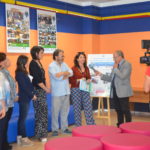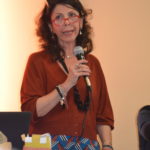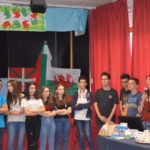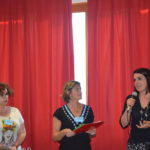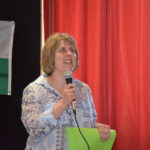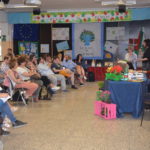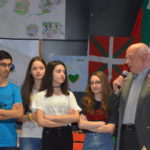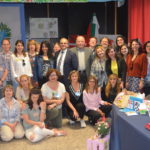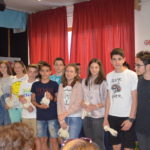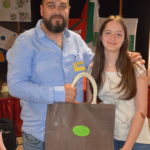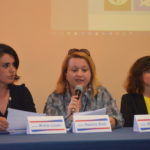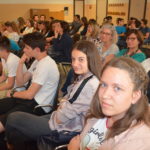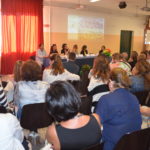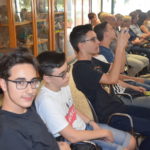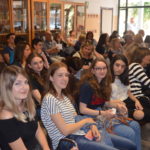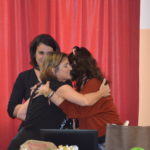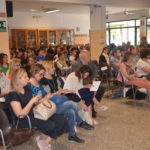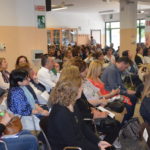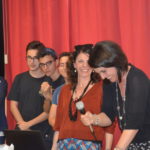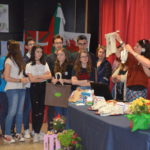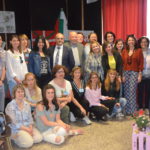Dear Legal Representative,
hereby we inform you that the National Erasmus Agency + INDIRE on 27.02.2019 has positively concluded the evaluation of the Final Report and of the documents supporting the activity referred to in the object.
The II Final Report was evaluated on the qualitative criteria indicated in Annex III of the Convention (Article IV) and obtained a score of 99.00 / 100 which does not involve any reduction in the contribution.
Below is the result of the evaluation of the Final Report, conducted by external experts:
Relevance of the project / strategy
The well-structured project was based on two fundamental objectives: professional training of teachers and innovation in the field of education with the introduction of entrepreneurship education in the school of the 1st cycle, one of the eight key competences identified as priorities, through a content that is part of the values and culture of the partner schools: environmental sustainability and education for active citizenship. The expected results have been achieved in a more than satisfactory way through a detailed planning of the action, implemented in line with the predictions. The activities, diversified and complementary to each other, have been implemented through the effective cooperation of the four partner schools, with results that would not have been achieved at this level if carried out in their own country. Of great value the opportunity offered to both teachers and pupils to get certifications for the skills acquired during the course. The project has created a network of good practices to address the environmental problems that threaten the areas on which the educational institutions insist; synergies have been achieved between different sectors of education, training and youth, capable of generating short and long-term added value within schools and the territories in which they operate.
Quality of the project design and implementation
The main objectives,
a) implementation of teaching-learning paths to start the acquisition of entrepreneurial skills in the Green Economy, starting from primary school, in a lifelong learning perspective
b) activation of an educational research process on the themes of entrepreneurship and sustainability through research-action work, have positively been inserted into a wider socio-economic reality, favoring possible developments for the future of students. The action was implemented in line with the approved funding; the resources assigned were allocated correctly and in line with the predictions. The activities were reorganized and carried out according to the plan prepared in the planning phase and allowed to achieve the set aims. Some changes in the implementation of the activities are justified by valid reasons for optimizing the results.
The organization of the LTTAs, combined in staff meetings and exchanges of student groups, proved to be positive and allowed the exchange of good practices, the knowledge of different cultures and the improvement of students and teachers’ skills. The involvement of other subjects in some activities was very important, with a consequent improvement in the prestige of educational institutions in their own territories and in a transnational context. The monitoring and evaluation activities are various and described in detail; numerous structured questionnaires in relation to the main activities provide indications on the various surveys and results achieved at all levels. The methodology, which included cooperative learning, interaction between research, ideation and practical implementation in cooperation, has been implemented in different forms and contexts and is described in detail in the main output, the devoted website, where you can find the presentation of the activities and of the methodology in a clear way. The use of the EUROPASS pathway certification system for mobility, was aimed at validating the skills acquired by the target groups.
Quality of the project team and the cooperation arrangements
The partnership originally included 5 schools, some of which had a previous productive collaboration on environmental issues. The work group has been expanded with new partners willing to share, expand and innovate the heritage of previous experiences. Cooperation and communication between the teachers of the partner countries has always been effective and has allowed the Danish Institute to reorganize the activities with respect to the initial plan. An active contribution offered by each partner is shown, balanced in the division of tasks, consistent with all the skills and profiles. Suitable forms of coordination are described, through a detailed program of face-to-face meetings and virtual meetings with the use of virtual communication systems, useful above all during student mobility. The site and the project’s Facebook page were other important vehicles for implementing communication and comparison among the subjects involved. Another virtual space was the “twinspace” of Etwinning, a sort of logbook of the project activities. All communication systems were useful and valid, there were no negative aspects.
Impact and dissemination
Numerous indicators of impact on the different target groups are listed and we refer to assessment tools used to verify the results of the activities. Good results achieved from the qualitative point of view by students regarding the improvement of basic skills and the ability to cooperate in mixed groups, by teachers from the point of view of the methodologies, implemented and shared in situations of cooperation and intercultural enhancement. It underlines the full achievement of the planned objectives, the involvement of numerous stakeholders and the production of tangible and online documentary materials. The results achieved may also be extended to different areas from the reference areas of the proposing organizations. The undertaken agreements between partners and the various stakeholders are described, in order to guarantee an optimal repercussion of the project in an enlarged dimension, and to support it in a period of time superior to that of its implementation.
A more detailed description is given of the impact on the Italian Institute compared to the other Institutes. The dissemination plan complies with the predictions; various channels, social networks, contexts and events were used to present the activities and results of the project, guaranteeing the transfer of innovative practices to promote the quality of learning, adult training and exchanges of experiences and good practices at European level . Educational products and resources have been made available without limitations. The site is easy to access and offers extensive documentation of the carried out activities, with elements of transferability especially in the adopted methodology and in the use of advanced technologies.
Overall comments to the beneficiary
The well-structured project was based on the professional training of teachers and innovation in the field of education with the introduction of entrepreneurship education in the different grades of school through a content shared by the partner schools: environmental sustainability and active citizenship education. For this purpose, an engaging methodological program was developed, based on cooperative learning, digital skills and virtual communication. The expected results have been achieved in a more than satisfactory way through a detailed planning of the action, implemented in line with predictions and using resources appropriately. The activities were carried out by reorganizing the plan prepared in the planning stage because a partner renounced and allowed to achieve the set objectives by enhancing the knowledge and skills of the teachers of all levels regarding sustainable development and entrepreneurship, both as transversal competence and as an engine for the economic development of a future society. The organization of the LTTAs proved to be positive and allowed the exchange of good practices, the knowledge of different cultures and the improvement of key competences for the target groups, especially through cooperation and shared work.
Monitoring and evaluation activities are described in detail; the expected impact is declined for all the subjects involved: students, teachers, but mainly refers to the Italian Institute, as well as the dissemination plan. It is the will of the partners to keep the project results visible, available and sustainable even in the long term, as well as usable for the improvement of educational methods and study programs.
It is recommended to share the results of the reported evaluation with all the project partners.
Following the evaluation of the sent documents, there is a final contribution of € 31,245.00, determined on the basis of what is indicated in Article II.25 of the Convention.
Considering that a pre-financing payment of € 24,996.00 was made, it is therefore a Balance equal to € 6,249.00 which will be paid according to the times indicated in the art. I.4.5 of the Convention.
It is announced that the approved results of the project have been made public on the Erasmus + Project Results Platform.
If you find the above information incorrect, please notify PEC within 30 days of receipt of the documents. Otherwise, this communication is intended as final.
Lastly, it is recalled that, based on the provisions of Article II.27 of the Convention, the Institute may be subjected to checks for five years starting from the date of payment of the final payment (this period is limited to three years if the amount of the grant granted is less than € 60.000,00).
Yours Sincerely
The Coordinator of the National Erasmus + Indire Agency
Dott.ssa Sara Pagliai
Category: Final Report
The speech of the Headmaster “Loredana Bucci” of the I.C. Renato Moro at the final meeting of the Erasmus + G.R.E.E.N. in Europe
This evening’s conference and the challenge of this morning conclude the innovative and exciting training course that lasted almost three years, from the design phase to the approval, application, realization and presentation of the final products, of our Erasmus plus Project entitled ” GREEN IN EUROPE “.
The “challenge” that the students of some second and third classes launched this morning to the Bulgarian students hosted on a problematic situation in Taranto, conceived and presented by the same boys and linked to the seventeen goals of the Agenda 2030, through the application of the business model CANVAS, as a resolutive strategy of the same problematic, was the tangible proof of the didactic commitment, of the study and research carried out by the teachers and pupils of the countries involved.This evening’s conference, in addition to summing up the design experience of the two years, will also see the presentation of the various outputs, edited by the Project Coordinator prof. Luca Battista and of the Primary School Coordinator Dr. Michela Leandro, ie the main and important products made by young people: from the packaging of eco-sustainable products to the commercials made, to the presentation of business models and related start-ups. Following the award ceremony.
The project, as we all now know, was born with the aim of exchanging and disseminating among teachers and students of our countries (Italy, Basque Country (Bermeo and Bilbao), Wales (Gilwern) and Bulgaria (Sofia) belonging to the European Community, “best practices” in the field of Green lifestyle, green economy and sustainable economic development.
Dear guests, in these two years we have tried to know, to spread, disseminate initiatives, paths and teaching practices aimed at making our young generations and therefore future citizens of the world acquire the fundamental knowledge and skills to mature a style. of life respectful of the environment, an entrepreneurial style starting from the reading, more than critical, proposing of our territories. And we believe that the results achieved are more than positive !
This is the occasion to thank with gratitude all the teachers, the professors involved and all the youngsters who, besides being guided by their teachers, have proved to be receptive, proactive and super active !
Now it’s up to you guys to mobilize families and territory !
Another important objective of our project was the training and self-training of teachers and students on the concepts of sustainability through the exchange of resources or useful documents and resources via the web.
Hence the need to acquire and develop certified technological skills through a targeted training path realized in the kick off meeting held in Taranto in November 2016 and also yesterday at our Institute with the issue of suitable certification, the ONLINE COLLABORATION. This training opportunity has allowed to overcome the physical distances between the various schools and the actors involved, encouraging online collaboration.
The training of the students, by the teachers through curricular and additional paths on the concept of sustainability, has allowed to identify and develop the relationships between environment-productive activities and companies in a mainly positive sense, but at the same time also allowed to mature sustainable behavior in in line with the Green Lifestyle and to train above all 1st grade secondary school pupils on fundamental principles and concepts such as Economics-Finance and Labor Market.
The onsite and online exchange and the dissemination of “good practices” that generate habits, ideas, solutions and entrepreneurial products linked to the principles of healthy living and sustainable economic and social green development, starting from local problems, has been the continuation of the training itinerary of the project.Undoubtedly at the base of these good practices it was essential to develop and implement, in the course of curricular activities, skills such as technology, language (English), advertising, initiative and entrepreneurship through the drafting of simple business plans and the next study of the Business Model Canvas
But let’s go over the various mobility together.
The first mobility took place in March 2017. Ten students of the secondary classes of the SSIG lived with the undersigned manager of this Institute and the accompanying teachers, an extraordinary experience in the Basque Country, host partner country, and in particular in Bermeo / Bilbao where they experienced a significant moment of cultural exchange that allowed them to know and deal with a socio-economic context, that of Bilbao, which thirty years ago presented the same environmental problems of the city of Taranto. The comparison between what was Bilbao and the discovery of eco-sustainable urban renewal allowed the students to discover a “best practice” to be “replicated” in their territory.We have also learned from the friends BASCHI … THEIR SENSE OF STRONG MEMBERSHIP, OF CORPORATIVISM, WHICH SUPPORTED THEM IN MANY YEARS IN THE SEARCH OF SOLUTIONS TO THE VARIOUS PROBLEMS.
“IL SENSO DI APPARTENENZA,” feeling compact … united … team … it is certainly the right spring to reach important goals and overcome difficulties.
In this school year, for the second year of the project, the mobility of primary school pupils took place. In October 2017, 11 students, always accompanied by the Scholastic Director and some teachers took part in the second mobility, this time in Wales to find out what it means to live according to an eco-sustainable lifestyle and get to know an ECOSCHOOL. The host school in Gilwern is Gilwern Primary School, a school where the watchwords are three: “RECYCLE, REUSE, REDUSE”. RECYCLE, RE-USE, REDUCE “.
Of GALLESE we have appreciated their wonderful “LIVE SLOW”, centered on the enhancement of natural beauties: a dimension of life that helps to mature a style oriented more towards “own wellbeing” and therefore … “feel good about yourself … it is equivalent to … feel good also with others “! In the green of your nature we have been really good … even our little ones!
Finally, in February 2018, the third mobility took place in Sofia, at the school “137 Angel Kancev”, during which the teachers attended an important training course at the “SofiaTech” center organized by the experts of the Junior Achievement. . The training day allowed the mobility participants to know what is at the base of the development of each “business plan”, that is the model of development of an entrepreneurial idea also called “Business Model Canvas” and the “social” version of the same. The “model” is the basis for the development of start-ups and is widely used by the teachers of the “Angel Kancev” secondary school in the entrepreneurial education path. Thanks to this training experience, the teachers of the I. C. Moro have been able to gain awareness that educating entrepreneurship is possible, but above all that, as underlined by the same experts of the Junior Achievement, the “Model Canvas” can constitute a “canvas” from which to carry out any planning activity.
Of the BULGARIANS we have especially APPRECIATED THE ATTENTION TO THE FUTURE GENERATIONS, a dimension of life projected towards the professional working realization.All these “our” qualities have allowed us to “appreciate” each other …, to understand and live our DIVERSITY as a real added value … that has allowed us to “compensate” us and at the same time to aim at acquire the qualities of each one of us.
We would be very happy to know, at the end of this summary, what the Erasmus friends think of us and our qualities.
Finally, it should be recalled that the quality element of the project was the Europass Mobility, ie the certification of all the mobility of cultural exchanges achieved, using the certification system for training credits provided for by the Europass European mobility plan.We believe that the structure of the project is certainly easy to convert, that is an exportable school curricular process that can be an example for other schools, but above all replicable in our educational institutions in line with the most recent changes made by MIUR to the National Guidelines with the document “National Indications and New Scenarios” in relation to the thematic scope of Citizenship and Sustainability.




